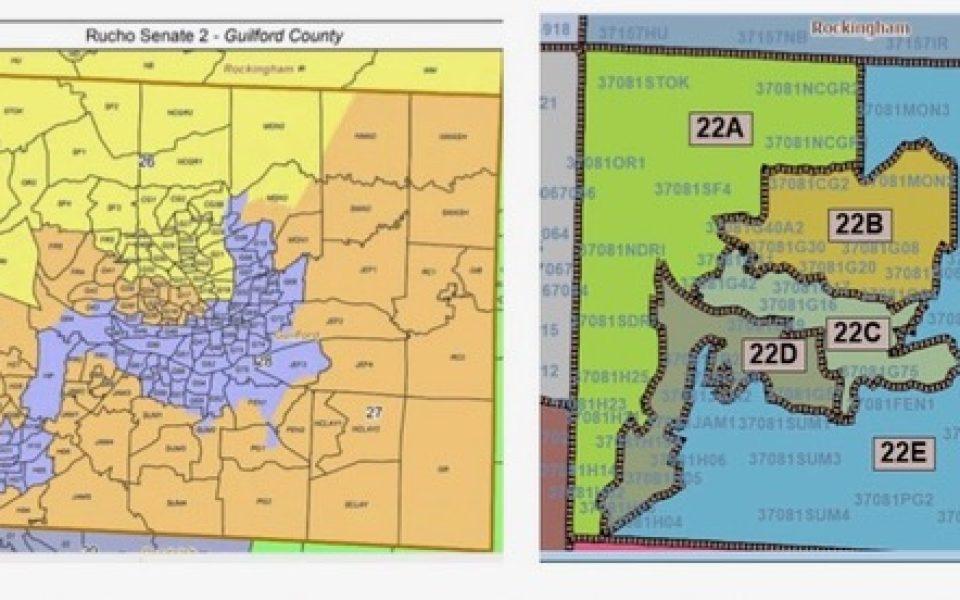The Republican-controlled General Assembly’s congressional maps have been rebuked by federal courts not once but twice — one for racial gerrymandering and one for partisan gerrymandering.
It’s a pretty stunning comeuppance, but the fact is they’re getting away with it. These were the maps originally drawn in 2011, and they’re appealing the latest decision on the grounds that there isn’t time to fix them before the 2018 election. And remember, in only three years we’ll be drawing maps all over again for the 2020 decennial Census. It can be hard to keep up with the continuous string of constitutional violations by this legislature, but keep in mind that the maps they drew for themselves were also ruled a racial gerrymander.
That’s a lot to consider, but don’t lose sight of the next play: While everyone’s attention is on the congressional maps, this illegitimate legislature has been drawing up plans to overhaul the state court system from top to bottom.
Melissa Price Kromm, executive director of NC Voters for Clean Elections, summed up the GOP leadership’s MO succinctly during a rally for fair courts in Raleigh last week.
“Our family just took down our Christmas tree; I have a 2-year-old toddler,” Kromm said. “I spent the whole Christmas season with her running up to the tree, grabbing all the ornaments, going, ‘Mine, mine, mine.’ That’s exactly what this General Assembly is doing to our courts. ‘Supreme court — mine! Court of appeals — mine! The thing is, the courts belong to we the people.”
Manipulating district lines to determine who serves in the US Congress and the state legislature is one thing, but rigging the courts is quite another. While the legislature has already reduced the number of seats on the court of appeals, now they’re looking at redrawing the lines for the district and superior court benches. A quick refresher: District court judges handle everything from misdemeanor drug possession, traffic offenses, resisting arrest and DWIs to domestic violence and resisting arrest, while superior court judges hear civil cases involving more than $25,000, appeals from district court decisions, and felonies up to first-degree murder and drug trafficking. Not to diminish the importance of legislators, but local judges make decisions that can profoundly affect individual lives.
“I think the clear trending of everything they’re trying to do is get more Republicans elected in judgeships, particularly in urban counties,” Sen. Floyd McKissick, a Democratic lawmaker from Durham who serves on the Senate Select Committee on Judicial Reform and Redistricting, told me.
The numbers are startling: Under House Bill 717, filed by Rep. Justin Burr (R-Stanly), Republicans are likely to win 48 out of 102 district court judgeships in North Carolina’s eight most populous counties — all Democratic strongholds — based on voters’ preferences in the 2012 presidential election. The proposed plan accomplishes this magical feat by overpopulating Democratic-leaning districts. I ran the numbers. Judicial districts for each county have an ideal population based on the total number of judges. Each district deviates to one degree or another, either over or under the ideal. Eighty-eight percent of Democratic-leaning districts in the district court plan are overpopulated while 93.8 percent of Republican-leaning districts are underpopulated. That’s a divergence that doesn’t occur by accident.
The map for Buncombe County, where Asheville is located, is particularly skewed. Based on the 2010 Census, Republican-leaning District 39A has 28,259 residents per judge, a deviation of 17 percent below ideal population, while Democratic-leaning District 39B has 41,761 residents per judge, overpopulating it by 14.3 percent.
The pattern for superior court judges is similar: 62.5 percent of Democratic-leaning districts are overpopulated, while 72.7 percent of Republican-leaning districts are underpopulated.
A recent review of the Senate plan performed by the Southern Coalition for Social Justice found much the same pattern. Statewide, the coalition found: “Republican judges would be expected to win 70-72 percent of superior court races and 69-71 percent of the district court judgeships. Likewise, the pairing of incumbent judges and strategic placement of open seats both demonstrate an overwhelmingly strong bias towards Republicans.”
Both the House and Senate plans also assign judges sparsely in urban counties. As the Southern Coalition for Social Justice notes, “the voters and judges in the largest and most Democratic counties are subject to overworked and understaffed judicial officers under this plan.”
The proposed changes tilting the scales in favor of Republican judges comes at a time when diversion programs to help youthful offenders avoid the crippling stigma of a criminal record are increasingly gaining traction, and judicial candidates are beginning to acknowledge racial disparities in the court system. That’s progress that could be wiped away by legislative fiat.
“North Carolina is a test case, y’all,” Kromm said. “If North Carolina succeeds at their attempts at stacking, packing and cracking our courts, it will spread like a disease across this country.”
Join the First Amendment Society, a membership that goes directly to funding TCB‘s newsroom.
We believe that reporting can save the world.
The TCB First Amendment Society recognizes the vital role of a free, unfettered press with a bundling of local experiences designed to build community, and unique engagements with our newsroom that will help you understand, and shape, local journalism’s critical role in uplifting the people in our cities.
All revenue goes directly into the newsroom as reporters’ salaries and freelance commissions.


Leave a Reply